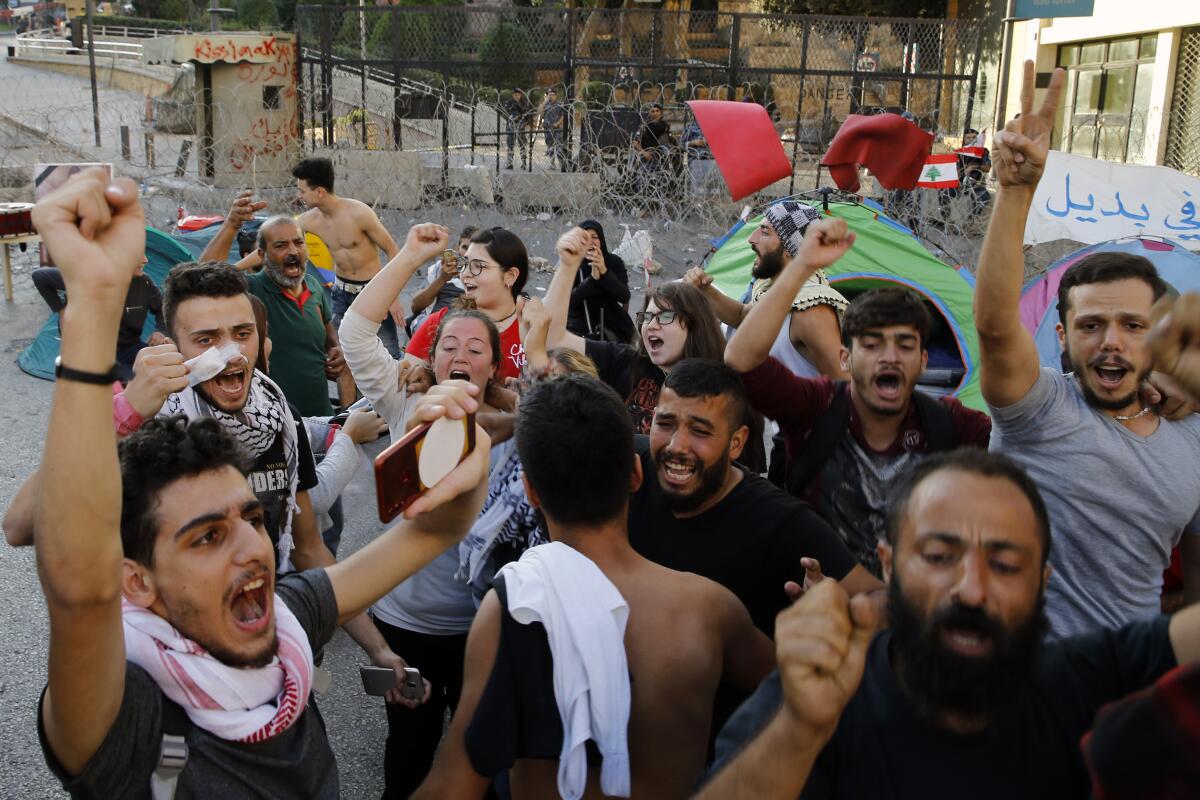Editorial: Lebanon’s exciting and dangerous demands for change

Lebanon, roiled by political protests, is also drowning in garbage. The two phenomena are linked.
In the four years since a key landfill closed, governmental ineptitude and political and sectarian rivalry have prevented any workable solution to the ensuing sanitation crisis: neighborhoods, rivers, hills and seashores lined with trash. Demonstrators took to the streets to express their anger in 2015, and have never completely let up.
But governmental dysfunction and corruption kept the outrages coming: daily electricity blackouts, unreliable internet access, outrageous telecommunication costs, an inability (or unwillingness) to alleviate persistent unemployment.
And then, last month, the last straw — a tax on texts and calls made over WhatsApp, the Facebook-owned service that has become the primary means of communication for Lebanese.
Of course, protesters are tired of living amid trash and extortionate fees, but what they’re actually railing against is the system of politics and factions that presides over this mess. In a clever but unsuccessful ploy, the nation’s leaders at first tried to align themselves with the protesters, but on Tuesday, Prime Minister Saad Hariri announced his resignation. Protesters threw a nationwide street party.
Still, this is Lebanon, so nothing is that simple. Hariri is still there, leading a caretaker government. One of a handful of possible next steps currently under discussion among the political factions is forming a new government — headed by Hariri. Meanwhile, Lebanese President Michel Aoun and parliamentary Speaker Nabih Berri still cling to power.
Under an agreement that dates back to the founding of modern Lebanon in 1943, the nation’s prime minister must always be a Sunni Muslim, the president a Maronite Christian, and the speaker a Shia Muslim. A 1990 update kept those strictures intact while modifying the required parliamentary division between Christians and Muslims. Various other positions are parceled out among Druze and Greek Orthodox Christians, and rulers vie among one another to enhance or undermine the power of outside forces, including Iran, Syria, Israel, Europe and the United States.
The current protests differ from their many predecessors in two important respects. First, representatives of most of Lebanon’s religious parties and factions have taken part, providing a kind of unity the nation has rarely seen. And second, many voices in these leaderless demonstrations have called for technocratic government — an administration by experts, governing according to ability rather than religious affiliation. That’s a demand that may sound odd to Americans or Europeans decrying government by entrenched political elites. Here, many Lebanese are saying, throw out the governing sectarian and familial elites in favor of people who know how to run a country.
The excitement, but also the danger, in the call for change is the disruption of the decades-old arrangement that has kept the nation from achieving its full economic and social potential but has also kept a lid on interfactional violence — with some horrific exceptions.
The deadliest and most disastrous failure of the accord was the Lebanese civil war of 1975 to 1990, in which approximately 120,000 people died. The war ended, as it began, with outside intervention and agreements essentially not to rock the rickety boat again.
The outside intervention continued as Iran, through its Shia ally Hezbollah, fought a proxy war against Israel in 2006. Syria virtually ran the country for years.
Many of the current protesters were quite young or not yet born when the civil war ended, so they know a Lebanon of beautiful landscapes and governmental ineptitude, not a country of endless violence. They may be more willing than the previous generation to demand change.
It is a critical time for Lebanon, and a time for careful movements by outside powers, including the United States. The U.S. and Europe have expertise and can offer various types of constructive mediation — if they move cautiously, cooperatively and diplomatically.
But unfortunately for Lebanon, this is not a time of particularly deft or practiced U.S. diplomacy. The White House may be prone to see the current crisis in Lebanon as an opportunity to rattle its saber at Iran and Hezbollah and to intervene on behalf of whatever faction is seen to serve its interests. That would be a shame, at just the time the world needs the U.S. to be a reliable broker and bastion of good government.
More to Read
A cure for the common opinion
Get thought-provoking perspectives with our weekly newsletter.
You may occasionally receive promotional content from the Los Angeles Times.










